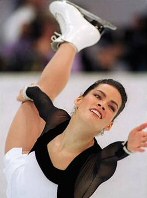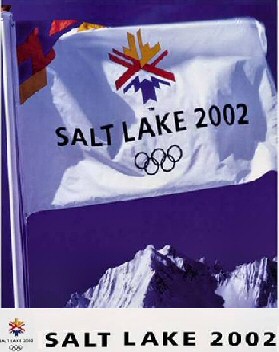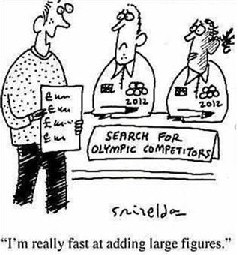The greatest Olympic scandals ever, as recorded by Will and Guy.
Some reports are of athletes’ dishonour, while other involve bribery by officials.
- Boris Onishchenko Montreal
1976 Fencing - Who Could Ever Forget the Insanity that Was Tonya Harding?
- 2002 Olympic Winter Games in Salt Lake City: Bribery?
- Roy Jones, Jr
Scandalous Boxing Decision - Keep Resetting the Clock Until You Have the Desired Result!
- Controversy in the Rome 1960 Men’s 100m Freestyle Olympic Final
- Skulduggery In the St Louis 1904 Olympic Marathon
Boris Onishchenko Montreal
1976 Fencing
Guy feels outraged by Boris Onishchenko’s cheating in the Pentathlon
fencing. Aside from drug taking this was the most blatant, and
especially the most pre-meditated, cheating unearthed at any Olympic
Games.
Onishchenko was a KGB officer, that in itself should put us on alert
that all is not quite as it seems. However, at the Montreal 1976
Olympics Onishchenko was a well known competitor having won a silver
medal at Munich 4 years earlier.
What his Soviet KBG team had done (for how long?) was to construct a
special fencing épée. All that ‘Boris the Cheat’ had to do was
press a secret button in the grip to simulate a ‘Hit’ on his
adversary. Normally a fencer has to actually touch his opponent
before the circuit is completed and a hit registered, but Boris only had
to wave his sword near his opponent and press his secret button and
bingo, he registered a score. It was Great Britain’s Jim Fox who
smelt a rat and exposed the “Disonischenko” Olympic scandal.
Incidentally, Great Britain went on to take the Pentathlon team gold
medal.
Some say that Boris was not only ejected from the competition, but
also from a hotel window – by his team mates. Others say that he
was sent in disgrace to a Siberian salt-mine. Most likely he was
promoted to Captain in the KGB!
Who Could Ever Forget the Insanity that Was Tonya Harding?

After figure skater Nancy Kerrigan was attacked and her knee
seriously injured, she was forced to withdraw from the 1994 USA Figure
Skating Championships. However, Kerrigan recovered and was able to
compete in the 1994 Winter Olympics, where Tonya Harding was placed eighth, and
Nancy Kerrigan took home the silver medal.
It was later discovered that Harding’s ex-husband
attacked Kerrigan in an attempt to take her out of the running for a medal.
A shocking development was that Olympic committee allowed Harding to
compete given that while she denied direct involvement she said, “I am
responsible, however, for failing to report things I learned about the
assault.”
One month after returning from the Winter Olympics, Tonya was
duly convicted of conspiracy to hinder prosecution. She was banned
from U.S. figure skating for life. Since 1994, Tonya Harding has
faced many other challenges. From the release of a sex tape and
drunken-driving arrest to charges of attacking her boyfriend with a
hubcap, scandal seems to follow this figure skater.
2002
Olympic Winter Games in Salt Lake City: Bribery?

disgrace involving
allegations of bribery to obtain the 2002 Olympic Winter Games in Salt
Lake City, Utah. Before 1995, the city had attempted several times to
secure the games, but failed each time. In 1995, Salt Lake City was
announced as the host city, but in 1998 the members of the International
Olympic Committee (IOC) were accused of taking bribes from the Salt Lake
Organizing Committee (SLOC).
As a result of the investigation into this, ten members of the IOC
were expelled and another ten were sanctioned. This was the first
expulsion or sanction for corruption in the more than a century the IOC
had existed.
Although nothing strictly illegal had been done, it was felt that the
acceptance of the gifts was morally dubious.
Stricter rules were adopted for future bids and ceilings were put
into place as to how much IOC members could accept from bid cities.
Additionally new term and age limits were put into place for IOC
membership, and fifteen former Olympic athletes were added to the
committee. For once the athletes were entirely innocent, this
scandal was down to the greed of the officials.
More
Shenanigans at the Winter Olympics, Salt Lake 2002
Figure skaters Jamie Salé and David Pelletier completed their pairs
routine, TV commentators proclaimed that it had been one of the best in
the history of the event. So it came as more than a mild
surprise when the Canadian pair found themselves in second place after
the results were announced.
It appears, record Will and Guy, that the French judge had been
pressured into voting for the Russian duo, who had botched elements of
their program, in exchange for similarly favorable treatment of the
French ice dance team. This was a really nasty Olympic scandal.
Roy Jones, Jr
Scandalous Boxing Decision
Boxing has suffered some dubious decisions down the years, but Roy
Jones was truly robbed of the gold medal when 3 home-town judges gave
the gold medal to South Korean Park Si-Hun. This decision was so
bad that even the winner apologised to Jones. On the film you
could see Jones giving Si-Hun a good pasting, fight analysts counted
Jones landing 86 punches to the gold medallist’s 28.
Another sign that boxing committee knew the result was a big mistake
came when they awarded Roy Jones the Val Barker trophy for the most
stylistic boxer at the Seoul 1988 Olympic Games. Those three
judges who voted against Jones were suspended, and inquiry found that
they had been received hospitality from the Koreans. In some ways
you have to admire the IOC’s tenacity in asserting the time honoured
cry, ‘The referee is always right’.
This was the same Roy Jones Jr who not only won the middleweight
world title, but also beat John Ruiz in a unanimous decision for the WBA
heavyweight championship.
Keep Resetting the Clock Until You Have the Desired Result!
The venue is Munich in 1972, and the USA is playing the USSR for
Olympic gold. The final match is very, very close. The game ends,
the USA celebrates their 50-49 win, only to be stopped mid-celebration
and told the clock has to be reset, due to a time-out not called.
The USA are unsettled and rather angry when the clock is set to
00:50. Russia fails to score. Celebration begins again, only to be
stopped one more time, and the teams told the clock would be reset to
three seconds because of an error in re-starting the clock correctly.
What happened next will go down in the annals of amazing sporting
results ever. Russia manages to score in those 3 seconds and wins:
51-50, and USA has forever refused to accept their silver medal.
When Being a Professional Was Illegal in the Olympics
Jim Thorpe, an American athlete, won gold medals in the pentathlon
and decathlon at the 1912 Olympics in Stockholm, Sweden. He lost his medals when it was discovered he was paid to play two
seasons of minor league baseball before competing in the games [at that
time, professional athletes were not allowed to compete in the
Olympics].
We are pleased to record that in 1982, Jim Thorpe’s Olympic awards were
reinstated.
It’s Best Not to Abuse the Watching Crowd
The last thing you expect to see is an Olympic athlete, who is
supposed to be composed, making obscene gestures at the crowd. However,
that’s just what Poland’s Wladyslaw Kozakiewicz did at the 1980 games in
Moscow. The crowd favourite was a Russian.
Having just secured his gold medal position, Kozakiewicz made the
gesture in defiance to the Soviet crowd. He later confirmed his
dominance over the competition by breaking the world record, clearing at
5.78 meters.
After claiming his medal, Kozakiewicz made a rude gesture towards the
crowd; it was a sort of “up yours” gesture. The official response of the
Polish government was that the gesture had been an involuntary muscle
spasm caused by his exertion. We wonder how many Polish children
went to school imitating Kozakiewicz the next day?
Olympic Games Scandal at the
Athens 1896 Marathon
In 1896 the Spiridon Louis won the first Olympic Marathon in
2hrs:58:50, and the course was only 40K and not 42.195K or 26 miles and
385 yds. Naturally, the race stated in the city of Marathon and
Louis enjoyed his fantastic reception in Athens. When he entered the
stadium 6 minutes clear of the rest, he was joined by the Crown Prince
Nicholas and Prince George who ran with him to the finish line and then
carried him in triumph to the royal box.
One has to feel sorry for Carlo Airoldi of Italy who had walked
nearly a thousand miles from his home in Italy to Athens, only to be
prevented from racing by Pierre Coubertin on the grounds that he was a
professional athlete.
In the event only 17 runners started in that first Olympic marathon.
Hungarian Kellner originally finished fourth and complained that the
Greek Belokas, who finished in front of him, had covered part of the
course in a carriage. To his credit Belokas admitted his guilt and
Kellner was duly awarded third place. This would not be the last
time that the Olympic marathon would finish in controversy.
Skulduggery
In the St Louis 1904 Olympic Marathon
In the marathon at the St Louis 1904 Olympic Games, Lorz hitched a
lift in his manager’s car for about 10 miles. Unsurprisingly for
those days the care broke down so a refreshed Lorz carried on jogging.
Eventually he reached the stadium, still well in front of the other
competitors and was hailed as the winner.
Though he initially went along with it, Lorz soon admitted the
deception. Thomas Hicks was judged the real winner of the 1904
Olympic Marathon.
Actually, Lorz was not a bad runner because he won the Boston Marathon
in 1905 with a time of 2:38:25.
Ben Johnson – Drugs Cheat
Sprinter Ben Johnson was sent home from the Seoul Olympic Games,
1988, in disgrace after the Canadian/ Jamaican tested positive for
anabolic steroid drugs after his “world record” 100m victory. This
was probably one of the most infamous scandals in Olympic history.
First Olympics Drugs Disqualification
Hans-Gunnar Liljenwall was a Swedish modern pentathlete who competed
in the 1968 Olympics in Mexico City. His team won the bronze but they were stripped of their medals when
he became the first ever athlete to be disqualified at the Olympics for
drug use.
Apparently, so Will and Guy have been informed, he drank
two beers before the pistol shooting part of the competition, to calm
his nerves.
Another Drugs Cheat
Doping and steroid use, although in the public spotlight now, has
been a part of the Olympics for years. One of the earliest recorded doping scandals took place at the 1960
games in Rome, when Danish cyclist Knud Enemark Jensen died after being
given Roniacol before his race. The drug was meant to increase his
blood circulation.
Controversy in the Rome 1960 Men’s 100m Freestyle Olympic Final
There were no automatic starting pistols or touch pads at the Rome
1960 Olympics. Electronic timing was in its infancy, and only used
as back-up; there was no reliance on replays.
Results in the swimming pool were decided by finish judges relying on
their eyes. There were three first-place judges and three more for
second-place. The race itself was desperately close, Manual Dos
Santos lead, but in the closing stages he was overtaken by both John
Devitt and Lance Larson. Controversy arose when the first-place
judges favoured Devitt by 2-1 and the second-place also had Devitt 2-1.
In summary the six judges were split, 3-3, in terms of who won.
In addition to these judges each competitor had three hand-timers,
each clocked Devitt, at 55.2 seconds. Whereas those timing Larson
recorded slightly faster times of 55.0, 55.1, and 55.1 seconds.
Under the rules the electronic timing should have been consulted, and it
showed Larson winning in 55.10 seconds and Devitt second in 55.16
seconds
What happened next was a scandalous abuse of power and a breach of
the rules. The head judge simply declared the slower Devitt, the
winner. No amount of protesting would overturn the result.
By all accounts both swimmers acted with dignity throughout the saga and
the years that followed. Lance Larson won a gold medal in the team
4 x 100m relay, in which he swum the butterfly leg.
A Minor Splash in the Moscow 1980 Diving
This was just a drop in the ocean as far as Olympic scandals go.
What happened was Aleksandr Portnov was waiting to perform his dive in
the springboard final when cheers broke out in the adjoining swimming
pool, because local hero Salnikov’s was swimming in the 1,500m final.
Portnov delayed his start until the noise had subsided but, as he took
his first steps along the board, even greater cheers broke out as
Salnikov won.
Under the rules of diving, as Portnov had started, so he should
finish. But having begun his run up, he could not stop before
take-off and dived badly. On protest to the Swedish referee
Olander Portnov was allowed to retake his dive, and as a result went
ahead of Mexico’s Carlos Giron. Naturally, the the Mexicans
protested and even the East Germans got into the act and argued that
their Falk Hoffmann had been disturbed by photographic flashlights.
When the waters calmed, Portnov remained the winner with Giron taking
silver and Cagnatto of Italy bronze.
1904 St Louis Fiasco
Hungary’s Zoltan Halmay was a Hungarian swimmer who won the 100 yards
and 50 yard freestyle in the 1904 St Louis Olympics. Incidentally,
this was the only Olympic Games which used a pool and race distances in
yards not meters.
Originally, Halmay beat American J. Scott Leary by a foot in the 50
yard event. However, the American swimming judge ruled that Leary
had won. This ruling resulted in a brawl and the other judges
ordered a rematch. Halmay won again.
Footnote
Please send us your infamous stories of Olympic
Games
scandals.
See more about The Rio 2016 Olympic
Games:
• Rio Olympics 2016 •
Funny Olympic cartoons
�
Olympics trivia
• Funny Olympics video •
Olympic rings •
Alternative Olympics •
Amusing Olympic video
•
Best Olympic champions
�
Olympic Games history •
Home


